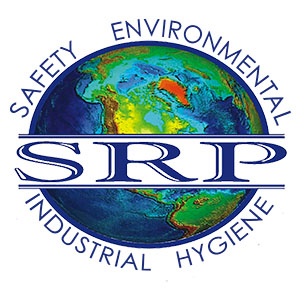SRP Environmental provides a broad range of health and safety training courses for the oil & gas industry. Here’s a quick rundown of ten of the more popular that will give you an idea of the types of training we provide.
1. Fire Protection
We offer fire two fire protection courses, one that deals with proper use of fire extinguishers, and one that covers the potential causes of fires and how to create a safe environment that prevents injury and loss from fires.
2. First Aid/CPR
Students completing our first aid/CPR courses receive certification through the American Red Cross in First Aid and Cardiopulmonary Resuscitation (CPR).
The First Aid course includes tips on treating minor wounds – cuts, insect bites, sprains, and strains – while the CPR class includes training in resuscitation of victims who are not breathing or have no heartbeat. The course also teaches how to use an Automatic External Defibrillator (AED).
3. Hearing Conservation
Employees who work in high noise areas like drilling rigs can potentially suffer hearing loss. As such, the OSHA Noise Standard requires annual training.
This two-hour training session includes:
- Overview of noise and its measurement;
- Health hazards of noise;
- Permissible noise levels;
- Audiometric testing program;
- Hearing protection;
- Record keeping; and
- Sources of noise.
4. Heat Stress
This course covers various heat-related syndromes including heat rash, exhaustion, and stroke. Methods to prevent heat stress and basic medical treatment of employees experiencing heat-related illnesses are also covered.
5. Job Safety Analysis/Job Hazard Analysis
Job Safety Analysis (JSA) is a proven process for controlling operating hazards and costs. It is a participatory process, requiring input, feedback and cooperative effort from line employees, supervisors, and upper management. The course provides participants with a step-by-step overview of the JSA process and examines participant’s role in the JSA.
6. NORM Training
Naturally Occurring Radioactive Material (NORM) can result from activities like burning coal, producing oil and gas and making and using fertilizers. Students learn about the different sources of NORM, how to protect themselves, and how to set up controls to reduce the effects when working around NORM.
7. Respiratory Protection
Based on OSHA regulations as outlined in 29 CFR, Part 1910.134, anyone who is required to wear a respirator – including disposable paper masks – must receive training in advance.
The course helps to satisfy this requirement and provides information on selecting the correct equipment, understanding how to protect oneself, how to clean and maintain equipment, and other OSHA requirements OSHA related to using respirators.
8. RigPass/Safeland
SRP Environmental’s IADC Accredited and SafeLand USA Endorsed Rig Pass course is designed to ensure that all employees on oil and gas sites have an equal level of core HSE training as a part of their orientation. The Rig Pass course is usually completed in a one-day, eight-hour class.
9. Spill Prevention Control and Countermeasure (SPCC)
SPCC training courses use a facility-specific Spill Prevention Control and Countermeasures Compliance plan based on the type of material being stored on the site, facility contingency plans, and employee involvement in spill response. Topics include the best approach to emergency responses, notification procedures, and an overview of incident command.
10. Stormwater Pollution Prevention
Employees taking this course study how pollution occurs when hazardous materials are transported by run-off water. They learn how to prevent leaks and keep waste from seeping into the water, how controls work, what safety measures and materials to use, and how to properly dispose of waste.
As this list attests, our training courses cover a broad range of health and safety issues, almost from A to Z. Visit our course page to see the entire catalog.

 ">
">
 ">
">